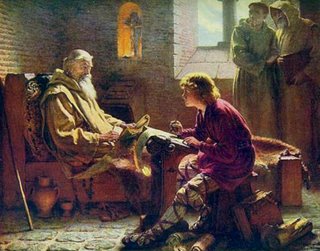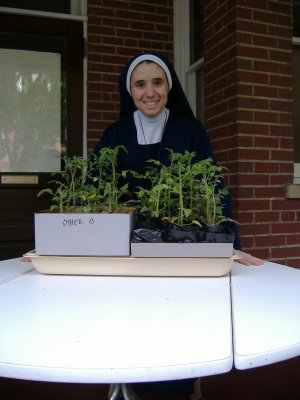31 May 2006
Solemnity of the Visitation
29 May 2006
Memorial Day
Jesus' reminder found in today's Gospel speaks a word of encouragement to those who have lost life, limb or loved one in the name of liberty. Those men and women who have laid down their lives on the altar of our freedom have walked a noble path behind the Lord's example. We honor those whose sacrifices have purchased our nation's freedom and defended the safety of countless other countries and peoples.
Few hymnals print all six verses of the Julia Howe's (pictured below) Battle Hymn of the Republic. The fifth verse bears repeating. Current arrangers and publishers have changed Howe's original words. It is here reprinted in its original.
- In the beauty of the lilies Christ was born across the sea.
- With a glory in His bosom that transfigures you and me:

- As He died to make men holy, let us die to make men free;
- While God is marching on. Glory! Glory! Hallelujah!
- Glory! Glory! Hallelujah!Glory! Glory! Hallelujah! While God is marching on.
As we commemorate Memorial Day, we remember all those who have purchased our freedom and defended our safety. May we be mindful and grateful for their service.
"In all things holy liberty and freedom must reign, that we may have no other law or constraint than that of love . . . "
St. Francis de Sales
27 May 2006
The Ascension(s) of the Lord!
All kidding aside, here in the metropolitan Archdiocese of Washington, DC we celebrate Ascension Thursday in place of the Seventh Sunday of Easter. And as we wait in hope for the coming of the Holy Spirit, we are reminded of part of Jesus' farewell discourse in the Gospel of John. In both yesterday's and today's Gospel, Jesus speaks of joy. A joy that "no one can take away." This is, perhaps, the hallmark of a healthy Christian life. Despite circumstances which may be difficult, the great mystery of our salvation, begun with the Incarnation and crowned with the Ascension, is the source of our hope and joy.
Whatever day you celebrate(d) the Ascension of the Lord, may it bring a profound sense of joy and an abiding peace in the Lord's good providence.
25 May 2006
St. Bede the Venerable
 Shown here on his deathbed, dictating the last of his scholarly work to a young monk, St. Bede the Venerable is one of the lesser known doctors of the Church.
Shown here on his deathbed, dictating the last of his scholarly work to a young monk, St. Bede the Venerable is one of the lesser known doctors of the Church.St. Bede is often mistaken for a Benedictine. A careful reading of his work "The History of the Monasteries of Wearmouth and Jarrow," however, reveals that St. Benedict Biscop, although trained by the Benedictines in Lerins, when he founded the Monasteries, constructed a rule for monastic life based upon several monastic rules which were in existence at the time.
23 May 2006
Squirrel Farmers
 This is a true story. Last August we noticed a vine growing several yards from the vegetable garden. It appeared to be something in the melon, cucumber or squash family and it covered a small area of shallow dirt comprised mostly of cedar mulch. Each of the sisters who work outside in the garden thought that another sister had planted the vine and carefully avoided uprooting it. Eventually, the truth came out: none of us planted the mysterious vine. The only logical conclusion: the squirrels.
This is a true story. Last August we noticed a vine growing several yards from the vegetable garden. It appeared to be something in the melon, cucumber or squash family and it covered a small area of shallow dirt comprised mostly of cedar mulch. Each of the sisters who work outside in the garden thought that another sister had planted the vine and carefully avoided uprooting it. Eventually, the truth came out: none of us planted the mysterious vine. The only logical conclusion: the squirrels.The compost heap is just a short walk from the location of the "mystery vine" and squirrels can often be seen rummaging through the compost pile for a snack. It seems likely that, upon finding some delectable seeds, one clever squirrel buried them in the shallow patch of dirt and mulch. At the end of the summer we enjoyed two sweet, juicy musk melons -- all thanks to the squirrels.
Just last week, this sprout was spotted in the same location. It is too soon to determine what type of fruit or vegetable it is, but it looks as thought the squirrels might have just planted us another tasty treat!
21 May 2006
Who Has Chosen Whom?
John 15:16
It is very easy to believe that our faith is to be credited to us -- as though we could choose to believe in the Incarnation, in the Eucharist, etc. Most of us become aware -- or remind ourselves often -- that faith itself is a gift from God. The desires to know God, to learn about God, to pray to God are all initiated by him. Even when we feel drawn to pray at a particular moment, we must remember that it is only a response to something that God has done first in our hearts. He is always one step ahead of us.
And today we are reminded that even the fundamental "yes" to follow the Lord -- to choose him as the center of our lives -- is also a mere response on our part. For it is he who has first called us, drawn us, led us to himself. This is a welcome reminder when we begin to feel inadequate or underqualified for some work that comes our way. We remember, in these moments, that the Lord does not call us because we are eminently qualified for some work he has in mind for us; rather, he provides the graces necessary, for those whom he calls, to carry out his work.
Today's Gospel is indeed good news: we are chosen. He has chosen us and called us and he will provide the graces necessary for us to be fruitful. Let us rejoice and be glad: we have been called and chosen. Let us resist the temptation to feel unprepared or discouraged when the Lord asks something of us.
19 May 2006
New Neighbors
 Mr. and Mrs. Duck have moved onto our lawn. They are pictured here crossing the path between Lalor House and the School (as they flee from the Sr. Mary Snapshot).
Mr. and Mrs. Duck have moved onto our lawn. They are pictured here crossing the path between Lalor House and the School (as they flee from the Sr. Mary Snapshot).
St. Francis de Sales didn't have much to say about ducks (bees, yes; ducks, no). He did, however, have a great deal to say about our neighbors and how we treat them. A few thoughts in that vein:
"We should not be like the Paphlagonian partridge which has two hearts, towards ourselves, gentle and loving but toward our neighbor one that is hard and severe. . . . Put yourself in your neighbor's place and him in yours, and then you will judge fairly."
17 May 2006
Welcome Bishop Wuerl!
 The archdiocese of Washington welcomes Bishop Donald Wuerl of Pittsburgh as its sixth archbishop. Yesterday morning, His Holiness Pope Benedict XVI announced his acceptance of the retirement of Theodore Cardinal McCarrick. There have been numerous articles and links on different news services. Cardinal McCarrick had some very gracious words about his successor during a press conference early yesterday. Kudos to Mr. P
The archdiocese of Washington welcomes Bishop Donald Wuerl of Pittsburgh as its sixth archbishop. Yesterday morning, His Holiness Pope Benedict XVI announced his acceptance of the retirement of Theodore Cardinal McCarrick. There have been numerous articles and links on different news services. Cardinal McCarrick had some very gracious words about his successor during a press conference early yesterday. Kudos to Mr. P almo for the first whisperings of this on 27 April. As usual, his coverage was thorough and articulate.
almo for the first whisperings of this on 27 April. As usual, his coverage was thorough and articulate.After a full day of press coverage, there is little left to be said about this exciting moment in our archdiocese that has not already been said. One quotation of Bishop Wuerl, however, bears highlighting. The New York Times reported that, when asked how he would handle the controversial and high-profile issue of pro-abortion politicians, his reply was, "I think the first job of a bishop is to teach." Right on. Welcome to Washington, your Excellency, we're ready to learn!
15 May 2006
'Tis the Season
 Tis the season...to plant and to sow, to weed and to reap. Today's commemoration of St. Isidore is a little-known and seldom celebrated outside of rural communities. St. Isidore, patron saint of farmers, was an eleventh century farmer known for his piety and devotion. His wife, Mary de la Cabeza is also revered as a saint.
Tis the season...to plant and to sow, to weed and to reap. Today's commemoration of St. Isidore is a little-known and seldom celebrated outside of rural communities. St. Isidore, patron saint of farmers, was an eleventh century farmer known for his piety and devotion. His wife, Mary de la Cabeza is also revered as a saint. Having spent his whole life working as a hired hand on a farm outside of Madrid, St. Isidore teaches us the timeless lesson that St. Francis de Sales would articulate and reiterate four centuries later: in all occupations holiness can be found, achieved and shared. Fidelity to the Lord, his wife and his daily work proved to be the path to holiness for this humble farmer.
13 May 2006
Nursery School Graduation
 No caps. No gowns. No Pomp and Circumstance. This "nursery school graduation" is for 21 tomato plants that will be transplanted to the garden this morning. Sister Anne E poses with the graduating class at left. All the transplants were born in the 4th Floor Fennessy "refugee camp." (If you are wondering why nuns are living in a refugee camp, click here to read a previous post about our renovation.)
No caps. No gowns. No Pomp and Circumstance. This "nursery school graduation" is for 21 tomato plants that will be transplanted to the garden this morning. Sister Anne E poses with the graduating class at left. All the transplants were born in the 4th Floor Fennessy "refugee camp." (If you are wondering why nuns are living in a refugee camp, click here to read a previous post about our renovation.)
All reports from the 4th Floor "refugee camp" confirm that this is a welcome day since the "grow light" which has been in the hall since mid-March is so bright sisters are able to read a book in the "dark" after turning in for the night.
All kidding aside, a garden provides ample opportunity to reflect upon the mystery of creation. Perhaps one of the highlights of something like a "nursery school graduation" is the thrill of looking at a plant and remembering when it was only a seed: dry, lifeless and tiny. It is a small window into the mystery of God himself to be able to look at a healthy plant and say, "I knew you when you were only a seed." Surely God must look at us and say the same thing.
"Be still and bloom where you are planted."
St. Francis de Sales
11 May 2006
On Friendship and Charity
09 May 2006
Demolition Details
 As promised, we will not abuse the patience of our readers with innumerable photos of every stage of our rebuilding -- just a small number of pictures for a peek into the work-in-progress.
As promised, we will not abuse the patience of our readers with innumerable photos of every stage of our rebuilding -- just a small number of pictures for a peek into the work-in-progress.Prior to the beginning of demolition, our project manager labeled all parts of the structure to be "demo" or "save." The orange graffiti added an interesting highlight to the muted colors of our walls. Some of the walls, as they come down, reveal extraordinary hand-crafted workmanship including some hand-fashioned nails.

Up-coming construction updates will include reports (and photos) from the "refugee camps" where the "nuns-in-exile" are living. Stay tuned!
"What a delightful and profitable law this is to do nothing except for God and to leave to Him the whole care of ourselves! I do not say only as regards temporal things ... but I refer to spiritual things and the advancement of our souls."St. Francis de Sales
07 May 2006
World Day of Prayer for Vocations
05 May 2006
Into the Lion's Den
03 May 2006
The Circus is Coming to Town!
 This post could be subtitled "Life in the monastery is never dull, installment II."
This post could be subtitled "Life in the monastery is never dull, installment II."The circus is not only "in town" but they are parked, for a few days, in our parking lot! Not the whole circus but a very significant part of the circus: the circus nuns. (We're not kidding!). Three members of The Little Sisters of Jesus (one of whom is an alumna of ours) travel with the Carson and Barnes Circus. While they travel with the circus they minister to the members of the circus in a host of different ways -- both physical and spiritual. They catechize the children, counsel adults, mend costumes, collect tickets and help care for the animals. To read more about their beautiful ministry, click here.
We have been been blest by the presence of the Little Sisters of Jesus who have joined us for Mass and Office these past few days. Their apostolate is certainly a beautiful testimony to the Gospel call to leave everything and follow the Lord. As they prepare to move along, we share St. Francis de Sales' sentiments which often punctuated a farewell when sisters said good-bye to begin a new foundation: "Those who go, stay; those who stay, go." We have enjoyed having our "circus sisters" with us and we send our love and prayers with them on their way.
To read more about Bl. Charles de Foucauld, the founder of the Little Sisters of Jesus, click here. To read more about Carson and Barnes Circus, visit their webpage or their blog.
01 May 2006
Month of Mary
“The Madonna was for [the early disciples] mother and teacher, a role she continues to develop for the Christians of every age. Each year in Eastertide, we relive most intensely this experience and maybe for this reason the popular tradition has consecrated to Mary the month of May, which normally falls between Easter and Pentecost. This month, which we begin [today], is useful for us to rediscover the maternal function which she develops in our lives, that we may always be docile disciples and courageous witnesses of the risen Lord.”
As we strive to do the Lord’s will in our daily lives – the little day to day decisions as well as the more significant ones – let us fix our eyes on Mary who was so faithful a disciple; from the moment she said, “Yes” to the Angel’s message, her life was never the same. Mary allowed her love for God and His incarnate Son to be the defining boundary for all her actions. Mary’s love for the Lord showed itself in her profound union with the Lord’s will for her throughout her life – in the few details we learn in the Gospels and the many details that remain obscured on this side of eternity. May she intercede for us and teach us to unite our hearts as lovingly as she did to the will of her Son.
“The fruit of love is obedience . . . Oh, my God! How happy we would be, if we were recognized by the exact practice of the solid virtues of our vocation, as the Son of God, in this world, made Himself known by the works of His mission!” St. Jane de Chantal
